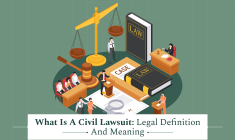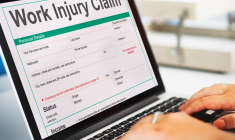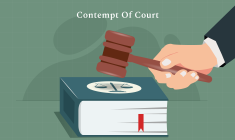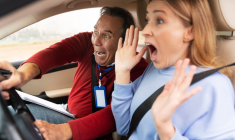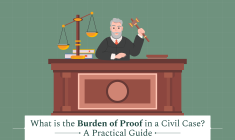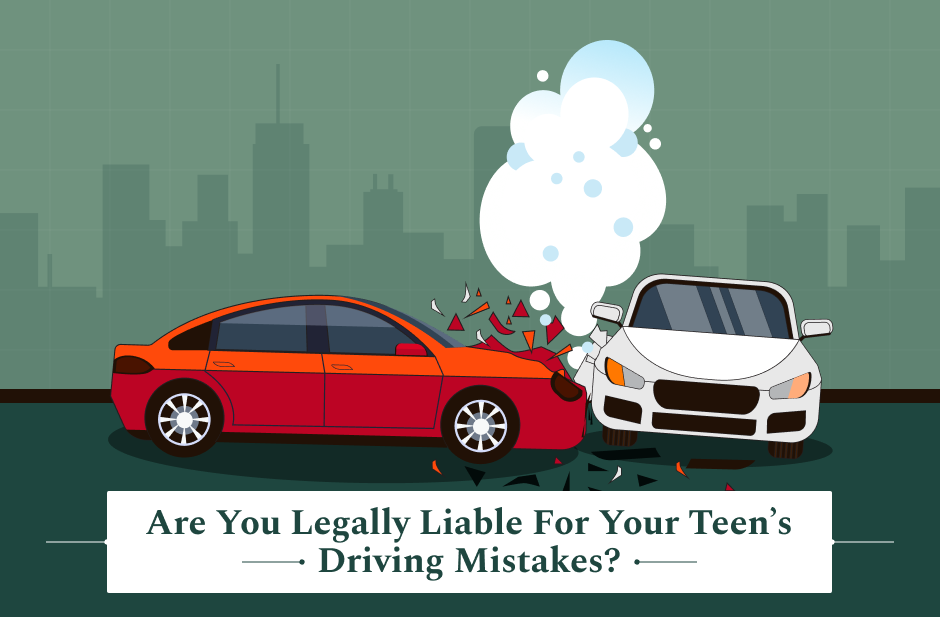Are parents liable for children’s car accident?” Trust me when I say that this is a question that most people ask.
When your teen starts driving, you take on more than emotional stress. You may be legally responsible for the mistakes they make on the road.
Knowing your legal exposure helps you avoid serious financial trouble. It also helps you guide your teen toward safer driving.
In this article, I will explain the laws, risks, and tools that affect your liability. You’ll learn how to protect yourself while helping your teen become a better driver.
So, if that is something you have been thinking about, you have come to the right place. Therefore, keep on reading
Are Parents Liable For Children’s Car Accidents?
When a teen causes a driving mistake, the legal impact often falls on the parent. Most U.S. states have laws that clearly define how and when parents can be held responsible.
Vicarious Liability and Negligent Entrustment
Vicarious liability means the parent is responsible if they own the car their teen was driving. This applies even if the parent was not present during the incident.
Negligent entrustment happens when a parent lets a teen with a record of unsafe behavior use the car. If the teen has a history of reckless driving or substance use, the parent is seen as allowing a known risk.
Co-signing the Driver’s License
Many states require parents to co-sign their child’s driver’s license application. This signature makes the parent legally tied to the teen’s actions on the road.
If the teen is in an accident, the parent can be held responsible in court. Signing the form is seen as accepting legal accountability.
Financial Exposure Through Insurance and Damages
Financial responsibility is a major part of teen driving liability. If your teen is involved in an accident, the costs can go far beyond emotional stress and traffic tickets.
Insurance Covers Initial Damages
When a teen crashes a vehicle, the car owner’s insurance usually pays for basic damages. This coverage depends on your policy limits and the specifics of the accident.
Policy Limits Can Be Exceeded
If the total damage from the accident goes beyond what the insurance covers, the parent may be responsible for the extra amount. This often happens in cases involving injury or multiple vehicles.
Parents Can Face Civil Lawsuits
In serious crashes, the other party may file a civil lawsuit to recover full compensation. If the parent is found liable, this can result in major out-of-pocket payments.
High Premiums Reflect Teen Risk
Insurance companies charge more for teens because of their high accident rates. These costs reflect the financial risk of covering new and inexperienced drivers.
Umbrella Policies Add Protection
Many families choose umbrella liability policies to protect themselves. These policies cover costs that exceed regular auto insurance limits and reduce legal exposure.
Each financial decision tied to teen driving has legal weight. Knowing your insurance details and preparing for the risks helps protect your assets and limits your liability.
Risk Factors in Teen Driving Behavior
Teen drivers are more likely to be involved in accidents due to emotional immaturity and poor decision-making. These factors make teens one of the most vulnerable groups on the road.
Distracted Driving Reduces Focus
Using phones, adjusting music, or talking to passengers takes attention away from driving. This delay in reaction time increases the chance of collisions.
Speeding Increases Impact Severity
Many teens drive too fast because of peer pressure or overconfidence. High speeds reduce control and raise the damage level in accidents.
Night Driving Limits Visibility
Driving in the dark challenges depth perception and alertness. Fatigue further reduces their ability to respond quickly.
Substance Use Leads to Impaired Judgment
Even one instance of alcohol or drug use can cause a crash. Impaired teens often make dangerous decisions with lasting legal consequences.
Parental Oversight Affects Legal Outcome
Courts review whether parents knew of risky behavior and failed to act. Legal responsibility can increase if parents ignore warning signs or allow unsafe driving.
Understanding these risk factors is key to reducing legal exposure. Managing your teen’s habits on the road can protect both lives and legal standing.
Importance of Vehicle Ownership in Liability
Who owns the vehicle involved in a crash directly affects who bears legal responsibility. This distinction becomes critical in legal disputes involving teen drivers.
| Parent Owns Vehicle | Teen Owns Vehicle | |
| Legal Liability | Parent is typically held liable for accidents caused by the teen | Teen may be held liable if they are insured and legally registered |
| Insurance Impact | Insurance is under the parent’s name; higher premiums apply | Teen must have a separate insurance policy; risk is evaluated directly |
| Additional Notes | Courts link ownership and responsibility directly to the parent | If the parent funds or controls the vehicle, courts may still assign them liability |
Legal Guardrails: State-Specific Teen Driving Laws
Teen driving is not just a matter of skill—it’s shaped by strict state laws that help young drivers ease into full responsibility. These laws exist to reduce accidents, improve judgment, and ensure teens gain real-world experience gradually.
What is the Graduated Driver Licensing System?
Most states follow a Graduated Driver Licensing (GDL) system that introduces driving in stages. It starts with limited freedom and builds up as the teen gains experience and proves they can drive safely.
Stage One: The Learner’s Permit
In the first phase, teens must drive only with a licensed adult. This stage is designed to give them practice under supervision before they face real-world traffic alone.
Stage Two: Intermediate License Restrictions
Once a teen moves past the learner’s permit, they enter the intermediate stage. They can drive alone but face limits on driving at night and carrying passengers, especially other teens.
Stage Three: Earning Full Driving Privileges
After holding the intermediate license for a set time without violations, teens can apply for full driving rights. This final stage confirms they’ve shown responsible behavior on the road.
Why These Laws Matter for Parents
Violating any part of these teen driving laws can cancel insurance coverage or increase legal risk. If a parent knows their teen is breaking the rules and does nothing, they may be held responsible if an accident happens.
Following these legal guardrails protects both the teen and the parent. Staying involved and aware is the best way to reduce risk and avoid legal problems.
Using GPS Tracking Devices for Monitoring
When you are out of the automobile, it is not easy to watch your teenager and control him/her over a mobile phone.
To solve this problem, the use of GPS tracking devices provides parents with the opportunity to keep in touch with their children and not interfere with them at the same time.
How GPS Devices Keep You Connected
The GPS tracker attached to your child’s vehicle offers on-demand data that can be used by you to know their driving patterns. You can check their speed, the way they drove, braking, and places they visited during each trip easily and in real-time.
Building Accountability Through Monitoring
A lot of times, once your kids notice that their driving is being watched, they start to drive more carefully. They are then persuaded to continue the safer driving practice due to the realization that it is not spying but being responsible while also giving you peace of mind.
Supporting Safe Driving Without Overreach
GPS tools are most effective when used in an open discussion. Teenagers who become aware of what is being traced and why tend to trust more and exhibit steady, vigilant driving behavior as a result.
Your Legal Guide: Parental Liability in Teen’s Car Accident
In a driving mistake involving a teenager, parents can be found guilty and thus bear legal and financial responsibility.
If a parent is knowledgeable about laws, ownership, and insurance, they reduce the risks related to this situation.
Overall, it is the control of your child’s driving behavior and the enforcement of rules that can cause major accidents to be avoided. The tools such as GPS tracking, and well-understood house rules make a lot of difference.
By doing these steps, you shield your child and yourself from legal problems. It also gives you an opportunity to handle issues before they become severe. Stay with your child, stay informed, and manage the risks even before they become that.
Read Also:
